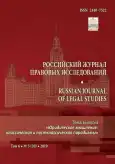The impact of economic analysis of law on legal thinking
- Authors: Koroleva E.A.1
-
Affiliations:
- Saint Petersburg state University of civil aviation
- Issue: Vol 6, No 3 (2019)
- Pages: 109-114
- Section: Methodology of Law
- URL: https://journal-vniispk.ru/2410-7522/article/view/19005
- DOI: https://doi.org/10.17816/RJLS19005
- ID: 19005
Cite item
Full Text
Abstract
The article deals with the main provisions of Richard Posner’s book “How judges think”, which is, according to the author’s own assessment, an attempt by an American scientist to understand the motives that guide judges in making judgments. The emphasis Posner puts on psychology leads to the fact that the book gives the right to talk about how judges think, not about judicial behavior: considering traits, temperament, race and gender, as well as personal and professional experience. From all the above Richard Posner concludes that judges are guided by the rationality of actions and decisions. Therefore, special attention in this article is paid to the concept of rationality from the point of view of Posner himself, as well as the assessment of this concept from the point of view of Russian scientists V.L. Tambovtsev and L.V. Smorgunov, since this concept of rational choice reveals the essence of economic analysis of law. Special attention should be paid to the argument that according to Richard Posner, rational choice does not have to be without error in the conditions of lack of information or the complexity of its collection and analysis. The arguments of Henry Beckett, as one of the founders of the economic analysis of law, on rationality in the Commission of an offense are given. Also, the article considers the facts that allow to state that at present the economic analysis of the law has gone far beyond the initial attention to Antimonopoly regulation, taxation, regulation of public utilities, corporate Finance and other usual areas of economic regulation, the range of issues that can be resolved through economic analysis of the law is much wider and more diverse. According to the results of races-judgements and the estimation of economic analysis of law and the category of rationality in the legal field.
Keywords
Full Text
##article.viewOnOriginalSite##About the authors
Ekaterina A. Koroleva
Saint Petersburg state University of civil aviation
Author for correspondence.
Email: katik@mail.ru
ORCID iD: 0000-0001-8052-408X
SPIN-code: 8366-0123
Senior Lecturer of Department of Social and Economic Disciplines and Service
Russian Federation, Saint PetersburgReferences
- Lavrushin K.V. Economic analysis of law // Problems of modern law: collection of articles in mater. LIII international. science.-prakt. Conf. No. 9(49). Novosibirsk: Sibak, 2015.
- Frontiers of legal theory / Per. from English. I.V. Kushnareva; ed. by M.I. Odintsov; NAT. research. University “Higher school of Economics”. Moscow, 2017. 480 p.
- Smorgunov V.L. Rational choice theory and comparative politics // Rational choice in politics and governance / ed. by V.L. Smorgunov. Saint-Petersburg, 1998. P. 3-35.
- Tambov V.L. What do we choose: legal positivism or economic imperialism? // New justice. Journal of case law. Moscow, 2009, No. 3(4). P. 30-39.
- Becker G.S. The Economic Way of Looking at Life. Nobel Lecture, December 9, Stockholm. 1992. 33 p. URL: https://chicagounbound.uchicago.edu/cgi/viewcontent.cgi?article=1509&context=law_and_economics (accessed: 29.05.2019)
- Coase R.H. The Problem of Social Cost // Journal of Law and Economics. 1960. Vol. 3. 45 p. URL: http://www2.econ.iastate.edu/classes/tsc220/hallam/Coase.pdf (accessed: 29.05.2019).
- John C. Interview with Richard Posner // The New Yorker. 13.01.2010. URL: https://www.newyorker.com/news/john-cassidy/interview-with-richard-posner (accessed: 11.10.2018).
- Miceli, T.J. Economics of the law. Oxford New York: Oxford University Press, 1999. P. 3.
- Posner, Richard A. How Judges Think. Cambridge, MA: Harvard University Press, 2008. 387 p.
- Posner, Richard A. Economic Analysis of Law. Seventh Edition. Wolters Kluwer Law & Business, 2007. 787 p.
Supplementary files







